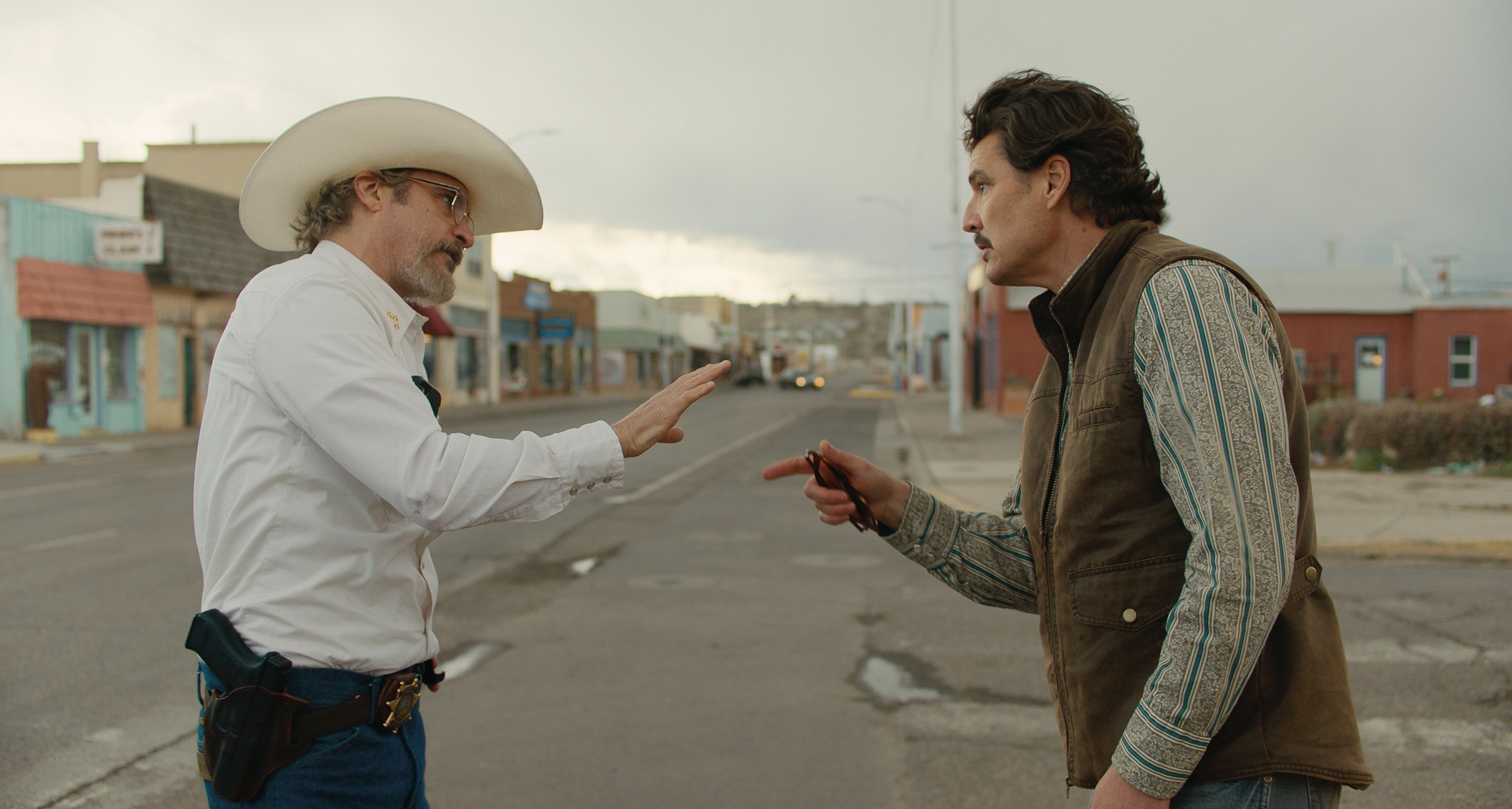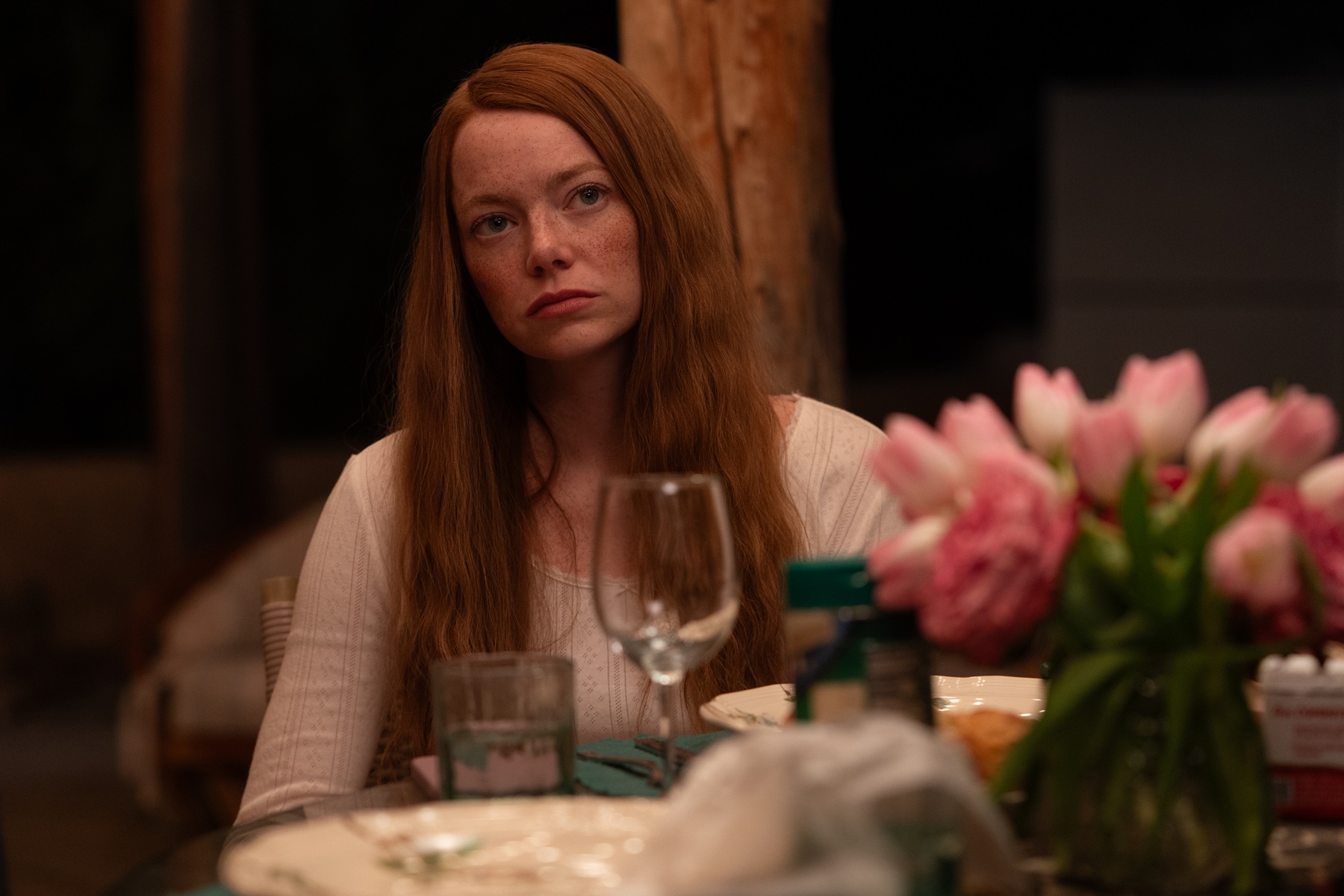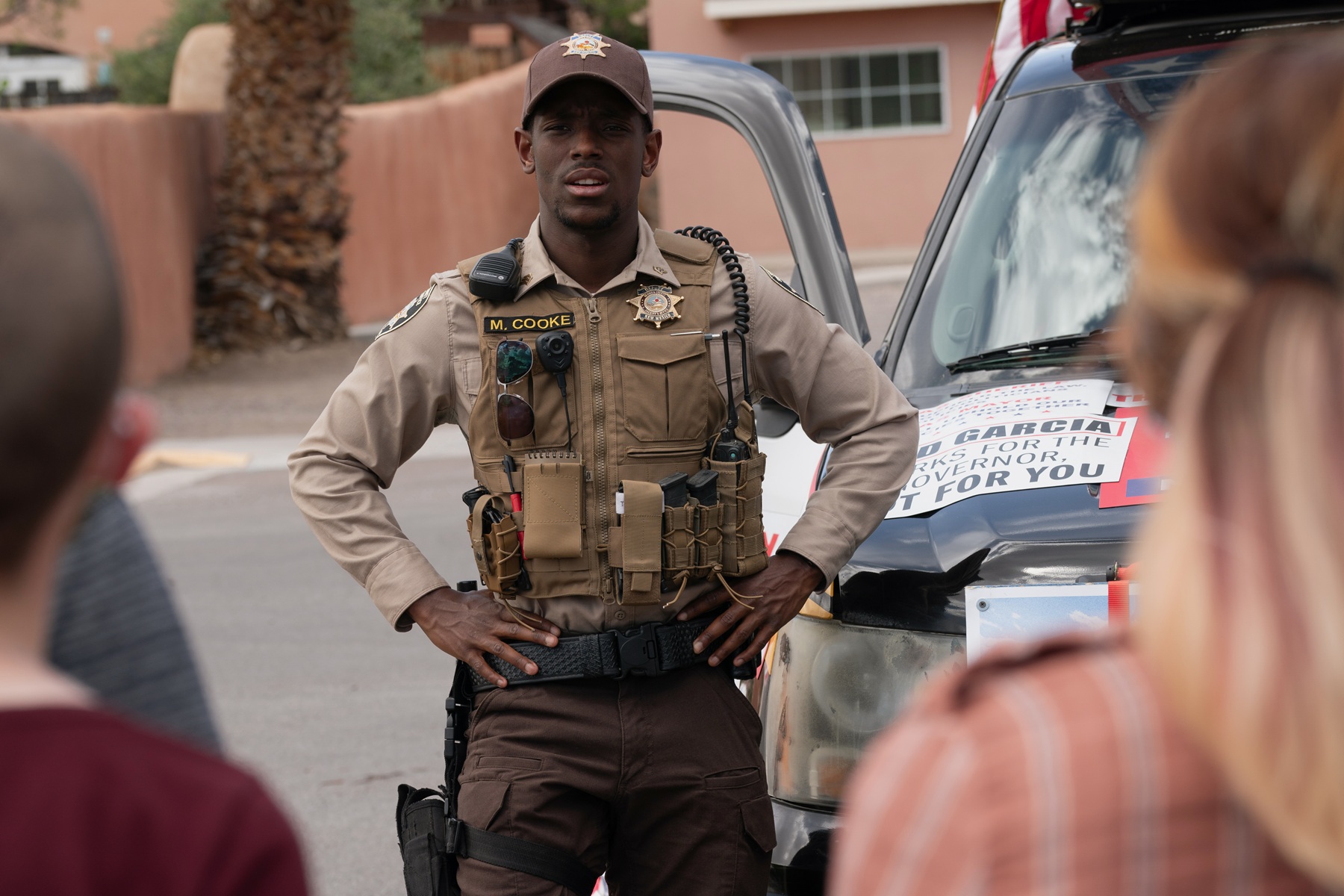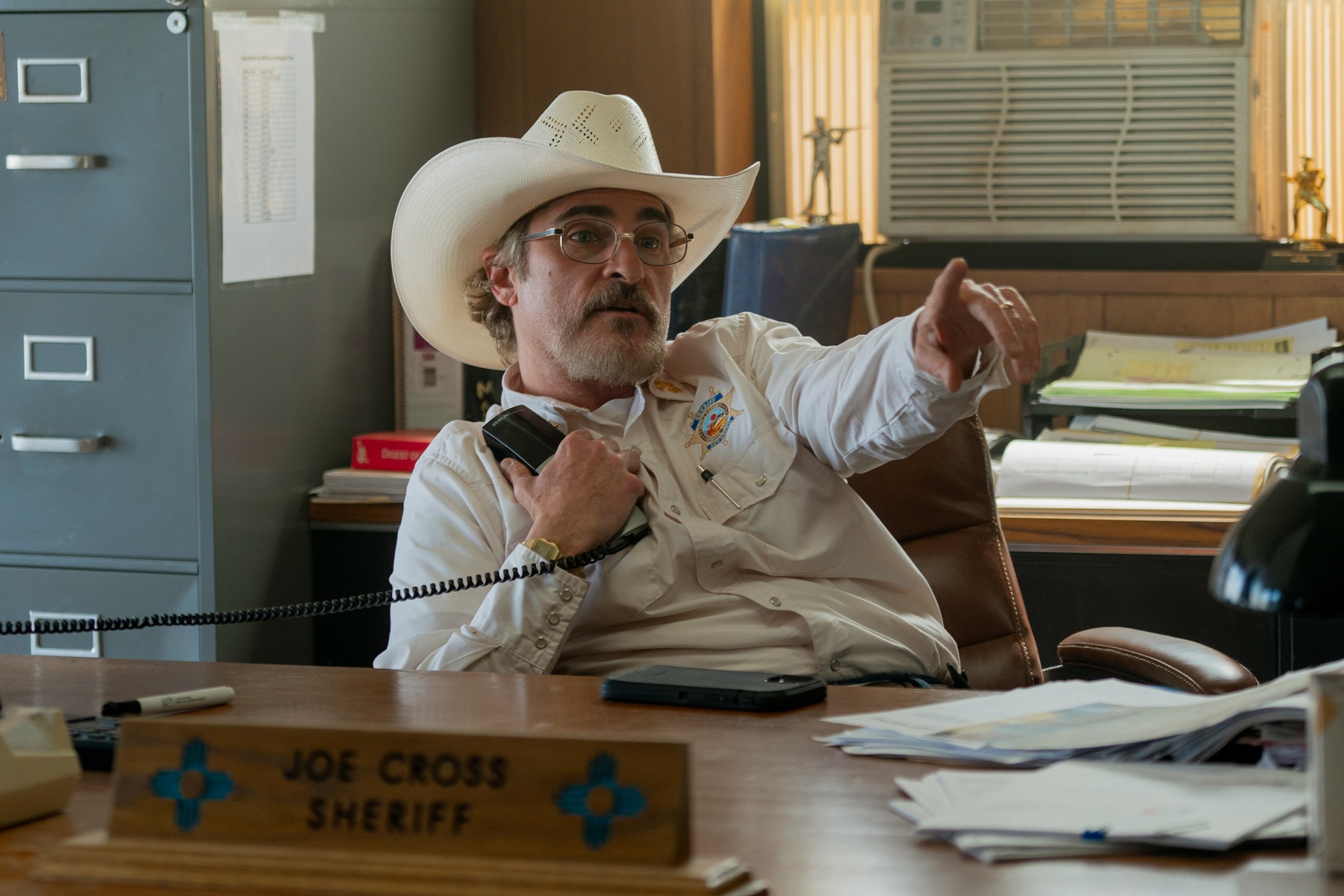‘Eddington’ analyzes beliefs gone wild

“Eddington” (2025). Cast: Joaquin Phoenix, Pedro Pascal, Emma Stone, Austin Butler, Deirdre O’Connell, Michael Ward, Luke Grimes, Clifton Collins Jr., Cameron Mann, Matt Gomez Hidaka, Amèlie Hoeferle, William Belieau. Director: Ari Aster. Screenplay: Ari Aster. Web site. Trailer.
Some would say – and quite astutely at that – there’s plenty of madness to go around these days, and they’d be right. But where and when did this begin? Many would increasingly agree that a good place to start looking would be the COVID-19 Pandemic, a time when fear was ratcheted up, conspiracy theories ran amok, “protective” measures slid into excessive overreach, neighbors routinely spied on (and often made unsupported accusations about) neighbors, and people’s imaginations were let loose without restraint. What began as an alleged but widely legitimized public health crisis soon spilled over into myriad other areas of life as tempers, paranoia and disinformation flared to new heights. So why did this happen? Insights into this phenomenon vary, but some plausible explanations are raised – and quite credibly – in the wild new comedy-drama-modern day Western, “Eddington.”
In May 2020, the world – along with the minds and imaginations of its inhabitants – were consumed by the global COVID-19 Pandemic. Fear was everywhere as everyone desperately sought guidance on how to cope with this ominous new virus. And, as officialdom handed down its recommendations – and, later, mandates – individuals dutifully began wearing their masks, getting vaccinated, sheltering in place and practicing social distancing when necessary. As time went by, however, those who stringently complied with these measures began adopting vigilante-like attitudes and taking matters to new levels of zealousness in their adherence to official policies. They began openly shaming others who failed to live up to these standards of behavior, even going so far as to document these failings with their cell phones. Paranoia and finger pointing grew, leading to public confrontations for even the slightest of infractions. And, given the stresses of being perpetually confined, tempers flared, spilling over into other areas of life, such as reactions to widely publicized events like the George Floyd killing in Minneapolis, inciting public demonstrations and riots, both locally and elsewhere.

No place was immune to these circumstances, either; even isolated, typically serene locales were affected. Such was the case in Eddington, New Mexico, the sleepy little fictional desert town depicted in this film. Incidents reflective of these conditions erupted with a ferocity that wasn’t known or previously seen here. The imaginations of residents were let loose to such a head-spinning degree that containment became a challenge for those in authority. What made matters worse was that it seemed as though logic and reason had been cast to the winds, with events spiraling ever more out of control. Indeed, the genie had been let loose from the bottle.
The film examines the reactions of Eddington residents from a variety of angles, not just in response to the pandemic, but also in connection with an array of other public and private scenarios, some of them new and others of which have been quietly simmering for some time. In doing this, writer-director Ari Aster provides a look into a world gone mad as all of these explosive issues emerged in a perfect storm of mass insanity. It’s a wonder how anyone could have survived conditions like these. And what made it worse was that these circumstances were all products of the residents’ own creations.
Numerous story threads run throughout this inspired release, all of them tied to the foregoing events. The main thrust of the narrative follows the growing feud between longtime, well-liked mayor Ted Garcia (Pedro Pascal), a by-the-book supporter of community welfare and official public health and safety policies, and sheriff Joe Cross (Joaquin Phoenix), a commonsense law enforcement professional who urges the public not to panic and to assess their circumstances realistically with an acute sense of discernment. When it comes to the COVID protocols, for example, Garcia believes in scrupulous compliance with official recommendations, no matter how rigorous they might be, while Cross encourages locals to analyze these policies with a sense of healthy skepticism, especially since the county where Eddington is located has had no reported cases of the illness. It’s the kind of standoff invariably found in virtually all classic Westerns.

But there’s more to the duo’s animosity than their differences of opinion on COVID policy; there are also longstanding personal issues between them that have been long asleep but have now been given license to awaken under the prevailing change in public temperament. The combined impact of all of the foregoing issues thus leads to a significant shift in their relationship: as matters grow increasingly heated and inherently more unpredictable, Cross challenges Garcia in the upcoming mayoral race in which the incumbent had been running unopposed, leading to growing political discord and factionalism. Those conditions are further exacerbated as the sheriff struggles to keep the peace in this once-sleepy little town, which has now been beset by protests mimicking those elsewhere over such controversies as unchecked police brutality, White privilege and outrage over the George Floyd killing, incidents far removed from rural New Mexico.
As these events play out, viewers are introduced to an array of colorful supporting characters, such as the sheriff’s wife, Louise (Emma Stone), a long-withdrawn, emotionally troubled follower of conspiracy theories who spends her days creating singularly distinctive works of fabric art; Vernon Jefferson Peak (Austin Butler), an increasingly prominent proponent of fringe conspiracy theories to whom Louise seems increasingly drawn; Louise’s busybody mother, Dawn (Deirdre O’Connell), who moved in with the couple temporarily (or so it was assumed) at the start of the pandemic but now appears to be taking up permanent residence with them; the sheriff’s deputies, Michael Cooke (Michael Ward) and Guy Tooley (Luke Grimes), who have been involuntarily recruited into working on their boss’s mayoral campaign while struggling with how to handle the growing social antagonism in their community; Eric Garcia (Matt Gomez Hidaka), the mayor’s son, a rebellious wise-ass who frequently finds ways to stir up trouble, especially as concerns his alleged best friend, Brian (Cameron Mann), and his pal’s hoped-for activist romantic interest, Sarah (Amèlie Hoeferle); Officer Jiminez Butterfly (William Belieau), the head law enforcement official of the neighboring Native American land who often gets under the sheriff’s skin for his thorough but unwanted investigatory diligence into matters that stray out of his jurisdiction; and Lodge (Clifton Collins Jr.), a psychologically challenged local vagabond who has a habit of somehow always showing up in the middle of the mayhem, serving as a symbolic physical embodiment of the character that has come to typify the new Eddington.

As the film unfolds, all of these scenarios eventually reach a breaking point, at which time circumstances become unhinged, the growing madness having finally brought matters to the brink of collapse. How will events play out? That, of course, remains to be seen, but, considering the exaggerated, unrestrained beliefs that have been unleashed throughout the community, it’s not difficult to imagine what results. And that is important to bear in mind in light of the role our beliefs play in the manifestation of our existence, a product of the conscious creation process, the philosophy that makes such outcomes possible. It’s unclear whether any of Eddington’s locals have ever heard of this school of thought, but, considering what’s at stake in this cautionary tale, it would behoove them to get a handle on it and its implications. That’s especially true given that they have collectively participated in this scenario’s materialization, one in which they have all leant their belief power to the creation’s unfortunate realization. And, given the power and persistence inherent in our beliefs, they represent a formidable force with which to be reckoned, one whose output may be difficult, if not impossible, to rectify going forward, a lesson from which we should all take heed.

It’s also intriguing to note how the filmmaker takes no prisoners in exploring this phenomenon. There’s plenty of blame to go around, from public officials to impassioned agenda-driven agitators to everyday citizens, and they represent all sectors of the social, political, economic and ethnic spectrums. Even those with supposedly noble ambitions aren’t spared for their excesses in this razor-sharp assessment. In short, no one’s been left out of this analysis, as everybody is seen as contributing to the emergence of such mass insanity. But then that’s not unexpected when everyone’s beliefs are simultaneously allowed to be let loose without restraint.
Can such madness be moderated? It’s possible, but several elements must fall into place to make it happen. To begin with, the participants in this scenario need to start by calming down and taking a long, deep breath, both literally and metaphorically. From there, they need to assess their beliefs to get a better handle on their validity. Indeed, just how realistic are they? Do they warrant support or scrutiny? Should they continue to be freely given energy, or should they be summarily scrapped in favor of more reasonable notions? This calls for employing a profound degree of discernment to determine just how compelling and meritorious these beliefs truly are and whether they should continue to be sanctioned. Sheriff Cross and his deputies try to follow such a course, at least initially, but maintaining such a level-headed degree of composure becomes increasingly difficult as conditions grow progressively unbalanced, irrational and emotionally charged. To be sure, considering how circumstances are unfolding, it would seem highly prudent that everyone should make an effort to tone things down before it’s too late.
One might legitimately wonder how and why conditions here were allowed to get so out of hand. And some might even believe that this satire is an overstatement of what really happened during that time, a fable that exaggerates “the truth.” But was it? In looking back at that time, many elements of that period uncannily resemble the events that take place in this film. Some may deny or conveniently fail to recall incidents like this, and perhaps they didn’t occur absolutely everywhere. But there’s plenty of on-the-record documentation depicting events like these, and it’s important that we own up to them, recognize how they emerged and consider how we might avoid their recurrence. Undergoing that kind of lunacy was bad enough once, let alone something we’d like to experience again. However, avoiding that depends on us and our beliefs – and whether or not we’ll allow them and us to let them get out of control again.

Itʼs been said that “hindsight is 20/20,” an expression the picture’s marketers have cleverly tweaked in its promotional tagline, that “hindsight is 2020.” But, contrary to the veracity usually accorded to this saying, how realistically are we to readily glean its wisdom? As this offering aptly illustrates, it may not happen as automatically – or even as often – as we might like to think. Thankfully, though, this is where writer-director Ari Aster has stepped in, gobsmacking us out of our indifference, denial and complacency with his fourth (and, arguably, best) feature outing. This no-holds-barred cinematic essay on that time in our recent past tells an epic saga that deftly blends elements of comedy, drama, modern-day Westerns and social satire, shoving its content squarely in our faces and forcing us to take a critical look at it, no matter how much many of us would rather not do so. The result is an incisive, insightful, incendiary multifaceted examination of what can happen when all sense of reason is abandoned.
The filmmaker’s even-handed approach in telling this story astutely examines the period’s prevailing conditions without judgment, pointedly depicting all of them with equal degrees of inspired and unfiltered skewering, employing a narrative style that in some ways reminds me of the work of director Yorgos Lanthimos. The picture maximizes its impact in this regard through skillful cinematography and film editing, bitingly scathing writing, and an excellent ensemble, including both leads and a host of colorful supporting performances. While the film’s final act is admittedly somewhat overlong and periodically scattered, the finished product overall nevertheless represents quite an accomplished work of filmmaking. This offering honestly won’t appeal to everyone and is likely to generate divisive (even heated) exchanges among both avid cinephiles and casual moviegoers depending on their individual sensitivities and viewpoints. But, for those unafraid of confronting issues that have largely been swept under the rug, this one is right up your alley.
As Mark Twain once shrewdly observed, “It’s easier to fool people than to convince them that they have been fooled,” and Aster draws on that sentiment heavily and frequently throughout this work. No matter what one may believe about the events of five years ago, the director skillfully spotlights the chaos of that time and how it often manifested as an exercise in deception, control and a loss of common sense in so many areas of everyday life. Let’s sincerely hope we learn our lesson from this film so that we needn’t go through an experience like that ever again.
Copyright © 2025, by Brent Marchant. All rights reserved.



